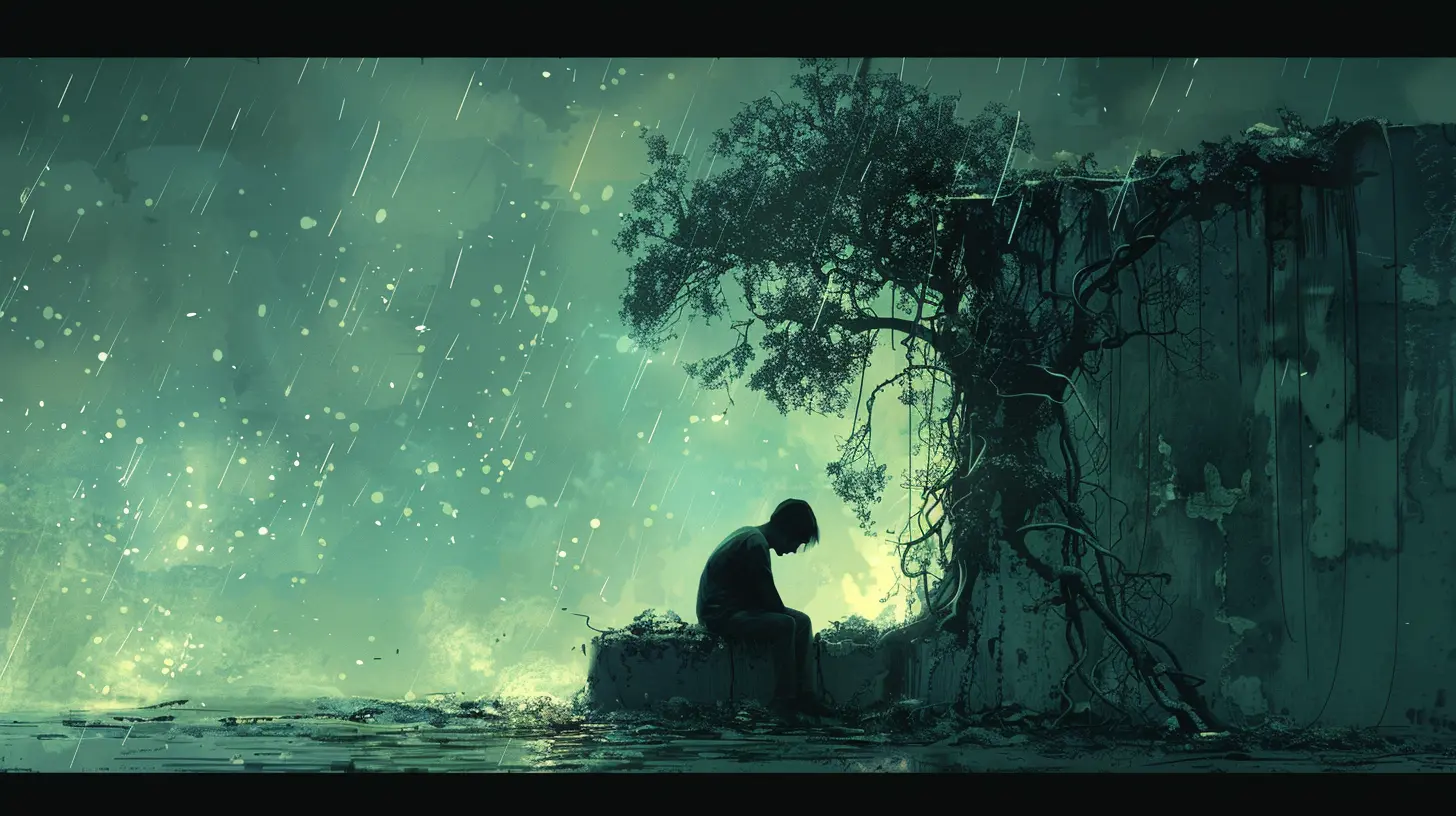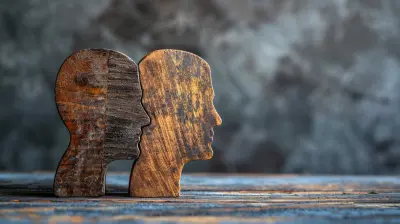Depression and Loneliness: Breaking the Isolation Cycle
24 November 2024
Depression and loneliness often walk hand in hand, forming a vicious cycle that can feel impossible to break. We’ve all had times when we felt down, but depression is far more than just feeling sad. Combine that with loneliness — feeling disconnected or isolated — and suddenly, you're stuck in a loop. The struggle is real, but there’s light at the end of the tunnel, even if sometimes it feels like a dim flicker.
In this blog post, we’re going to dig deep into the relationship between depression and loneliness, how they feed off each other, and most importantly, how you can break free from the cycle. Whether you're dealing with it yourself or trying to support a loved one, this is for you.

Understanding Depression and Loneliness
Before we get into the nitty-gritty, it’s important to understand what we’re really talking about here. Depression and loneliness are two different beasts, but they often work together to wreak havoc on your mental health.What is Depression?
Depression is more than just feeling sad. It’s a mental health condition that affects how you think, feel, and act. It can make even the smallest tasks feel monumental, sap your energy, and leave you feeling hopeless.Some common symptoms include:
- Persistent sadness or “empty” feelings
- Loss of interest in activities once enjoyed
- Fatigue or lack of energy
- Difficulty concentrating, remembering, or making decisions
- Feelings of worthlessness or guilt
- Thoughts of death or suicide
Depression can make you feel like you’re stuck in a fog that just won’t lift, no matter how hard you try. And when loneliness enters the equation, it can make that fog even thicker.
What is Loneliness?
Loneliness isn’t just about being physically alone. You could be surrounded by people and still feel lonely. It’s that aching sense of disconnection, like you’re emotionally removed from everyone around you.Loneliness can manifest in several ways:
- Feeling like no one understands you
- Struggling to form meaningful connections
- The sense that you’re always on the outside looking in
- A deep feeling of isolation
Loneliness can hit anyone, at any stage of life, and it often sneaks up on you. One day you’re fine, and the next, you find yourself feeling like you’re stranded on a deserted island — even if you’re in the middle of a crowded room.

How Depression and Loneliness Feed off Each Other
Here’s where things get tricky. Depression and loneliness often fuel each other in a destructive cycle. Feeling lonely can worsen your depression, and feeling depressed can make it harder to connect with others, which in turn deepens your loneliness.Imagine you’re in a room with no doors — that’s what this cycle can feel like. The more you try to get out, the more trapped you feel. But the truth is, there is a way out; you just have to find it.
Depression Leads to Isolation
Depression makes it tough to reach out to others. You may feel like you’re a burden or that no one will understand what you’re going through. It’s not uncommon to withdraw from social activities, cancel plans, or avoid phone calls. The problem is, the more you isolate yourself, the deeper your feelings of loneliness become.Loneliness Intensifies Depression
On the flip side, loneliness can exacerbate depression. When you’re lonely, it’s easy to fall into the trap of negative thinking. You might start believing that no one cares about you or that you’re fundamentally unlovable. These thoughts can spiral out of control, leading to a deeper sense of hopelessness and despair.And so the cycle continues: depression leads to more loneliness, and loneliness leads to more depression.

Breaking the Cycle: It’s Hard, But Not Impossible
Breaking the cycle of depression and loneliness is no small feat. But the good news is that it can be done. It’s important to remember that progress doesn’t happen overnight, but every small step you take is a step toward healing.Let’s talk about some strategies that can help you break free from this isolating cycle.
1. Acknowledge Your Feelings
The first step toward breaking the cycle is acknowledging how you feel. It’s easy to try to push your feelings aside or ignore them, but that only makes things worse in the long run. Take some time to really sit with your emotions. It might be uncomfortable, but it's necessary.Ask yourself:
- How am I really feeling?
- What emotions am I trying to avoid?
- Why am I feeling this way?
Journaling can be a great way to explore your thoughts and feelings. Writing things down can help you make sense of what’s going on inside your mind and give you a clearer picture of what’s contributing to your depression and loneliness.
2. Reach Out, Even When It’s Hard
When you’re feeling depressed and lonely, the last thing you might want to do is reach out to others. But that’s exactly what you need to do. Human connection is one of the most powerful antidotes to loneliness.Start small. You don’t have to spill your guts to a stranger or suddenly become a social butterfly. Call a trusted friend, send a text, or even just smile at someone in the grocery store. These small connections can make a big difference.
If you’re not ready to talk to someone you know, consider joining a support group or talking to a therapist. Sometimes, it’s easier to open up to someone who isn’t directly involved in your life.
3. Challenge Negative Thoughts
Both depression and loneliness tend to come with a lot of negative self-talk. You might find yourself thinking things like, “No one cares about me,” or “I’m not good enough.” These thoughts can feel overwhelming, but they’re not based in reality.One of the best ways to challenge these thoughts is through cognitive behavioral therapy (CBT). This type of therapy helps you identify and reframe negative thought patterns. You can practice this on your own by writing down your negative thoughts and then coming up with more balanced, realistic alternatives.
For example:
- Negative thought: “No one cares about me.”
- Reframed thought: “I have people in my life who care about me, even if I don’t always feel it.”
4. Engage in Activities That Bring You Joy
When you’re depressed, it’s hard to find joy in anything. But engaging in activities that you used to enjoy can help lift your mood, even if just a little bit. It might feel like you’re going through the motions at first, but over time, these activities can help bring some light back into your life.Ask yourself:
- What did I used to love doing?
- What hobbies or passions have I neglected?
Whether it’s painting, hiking, reading, or cooking, make time for activities that bring you a sense of fulfillment. Even if it’s just for a few minutes a day, doing something you enjoy can help break the cycle of depression and loneliness.
5. Take Care of Your Physical Health
Your mental and physical health are closely connected. When you’re feeling depressed and lonely, it’s easy to neglect your physical well-being. But taking care of your body can have a big impact on your mood.Here are a few ways to prioritize your physical health:
- Exercise: Even a short walk around the block can boost your mood. Exercise releases endorphins, which are natural mood lifters.
- Eat Well: A balanced diet can help stabilize your mood and give you the energy you need to get through the day.
- Sleep: Lack of sleep can make depression and loneliness worse. Aim for 7-9 hours of sleep each night.
6. Practice Mindfulness and Meditation
Mindfulness and meditation can be powerful tools for managing depression and loneliness. These practices help you stay present in the moment and reduce the constant stream of negative thoughts that often accompany depression.You don’t have to spend hours meditating to see the benefits. Even just five minutes a day can make a difference. Try a guided meditation app or simply focus on your breathing for a few minutes. Over time, mindfulness can help you feel more grounded and less overwhelmed by your emotions.
7. Seek Professional Help
If your depression and loneliness feel unmanageable, it’s important to seek professional help. A therapist or counselor can provide you with the tools you need to break the cycle and start feeling better.Don’t be afraid to reach out for help. There’s no shame in seeking support, and it can make a world of difference in your mental health.

You Don’t Have to Go Through This Alone
It’s easy to feel like you’re the only one going through this, but you’re not. Depression and loneliness are incredibly common, and many people are struggling with the same feelings you are. The key is to remember that you don’t have to go through this alone.Breaking the cycle of depression and loneliness is hard, but it’s possible. Start with small steps, reach out to others, and take care of yourself. Over time, you’ll begin to see the light at the end of the tunnel, and that fog of isolation will start to lift.
Remember, there’s no rush. Healing takes time, but with patience and persistence, you can break free from the cycle and start feeling connected again.
all images in this post were generated using AI tools
Category:
DepressionAuthor:

Jenna Richardson
Discussion
rate this article
12 comments
Zina Weber
Breaking the isolation cycle requires not just understanding the interplay between depression and loneliness, but also fostering authentic connections that ignite hope, reminding us that even in darkness, we are not alone.
February 3, 2025 at 5:37 AM

Jenna Richardson
Thank you for your thoughtful comment! You're absolutely right—building genuine connections is essential for overcoming the isolation that often accompanies depression. Together, we can find hope and support.
Bradley McNaughton
This article beautifully captures the struggle many face with depression and loneliness. It’s a reminder that reaching out and sharing our experiences can truly break the isolation cycle. We’re all in this together! Thank you for sharing.
January 29, 2025 at 4:48 PM

Jenna Richardson
Thank you for your kind words! I'm glad the article resonated with you. Together, we can foster connection and understanding.
Emmett Riley
This article effectively highlights how understanding the link between depression and loneliness can foster meaningful connections.
January 25, 2025 at 4:22 AM

Jenna Richardson
Thank you! I'm glad you found the connection between depression and loneliness meaningful. It's crucial for fostering understanding and support.
Iris Gill
Thank you for this insightful article! It beautifully captures the deep connection between depression and loneliness, reminding us that breaking the isolation cycle is crucial for healing. Your compassionate approach encourages readers to seek support and connection, fostering hope and understanding in their journeys. Keep up the great work!
January 20, 2025 at 5:27 AM

Jenna Richardson
Thank you for your kind words! I'm glad the article resonated with you and highlighted the importance of connection in healing. Your support means a lot!
Joel McKittrick
Thank you for this insightful article! It’s a vital reminder that connection can heal and uplift us.
January 14, 2025 at 5:23 PM

Jenna Richardson
Thank you for your kind words! I'm glad you found the article meaningful. Connection truly is powerful in overcoming loneliness.
Payton Torres
Breaking the isolation cycle? I tried, but my couch and I have become such close friends, we’re considering naming our next Netflix binge ‘The Chronicles of Couch Potato: A Love Story!’ Let’s get moving!
January 2, 2025 at 5:24 PM

Jenna Richardson
It's great to see humor in your experience! Remember, small steps count—try mixing in short walks or activities you enjoy to break that cycle. Every little bit helps!
Liora Wood
Thank you for this insightful article on the complex relationship between depression and loneliness. Your suggestions for breaking the isolation cycle are both practical and compassionate. Raising awareness about these issues is essential, and I appreciate the supportive approach you've taken to help others find connection and hope.
December 29, 2024 at 3:41 PM

Jenna Richardson
Thank you for your thoughtful feedback! I'm glad you found the article helpful and appreciate your support in raising awareness about these important issues.
Flint Clayton
This article effectively highlights the intertwined nature of depression and loneliness, offering valuable insights and strategies to break the isolation cycle and foster connection.
December 15, 2024 at 4:58 PM

Jenna Richardson
Thank you for your kind words! I'm glad you found the insights valuable in addressing the connection between depression and loneliness.
Mindy McKellar
Thank you for this insightful article. It's a reminder that acknowledging our struggles with depression and loneliness is the first step toward connection. By sharing our experiences, we can help break the isolation cycle and support one another in healing.
December 7, 2024 at 5:49 PM

Jenna Richardson
Thank you for your thoughtful comment! I completely agree—sharing our experiences is vital for healing and fostering connection.
Emmeline Taylor
Great insights! It's so important to connect and share—we're all in this together!
November 30, 2024 at 4:24 AM

Jenna Richardson
Thank you! Absolutely, connection is key to overcoming isolation. Together, we can make a difference.
Caroline Rocha
I’m fascinated by how depression and loneliness intertwine. What specific strategies can we adopt to effectively break this cycle and foster connection?
November 28, 2024 at 4:49 AM

Jenna Richardson
To break the cycle of depression and loneliness, consider strategies like engaging in regular social activities, practicing mindfulness, seeking support from friends or professionals, volunteering, and establishing a routine that includes self-care and connection with others.
Evangeline Malone
Breaking the isolation cycle requires understanding that connection is vital for healing. By reaching out and fostering meaningful relationships, we can combat the feelings of depression and loneliness, transforming our experiences into pathways toward resilience and hope.
November 27, 2024 at 3:28 AM

Jenna Richardson
Thank you for highlighting the importance of connection in healing. Building meaningful relationships is indeed essential in overcoming depression and loneliness, and it fosters resilience and hope in our lives.
MORE POSTS

How Mindfulness Practices Can Help Alleviate Depression

How to Support Your Child Through Big Emotions

Bipolar Disorder and Emotional Dysregulation: What You Should Know

The Role of Social Networks in Shaping Political Beliefs

The Role of Family Therapy in Bipolar Disorder Treatment

How Social Comparison Affects Our Happiness and Well-Being

The Role of Self-Compassion in Overcoming Depression

Addiction in the Workplace: Recognizing the Signs and Offering Support